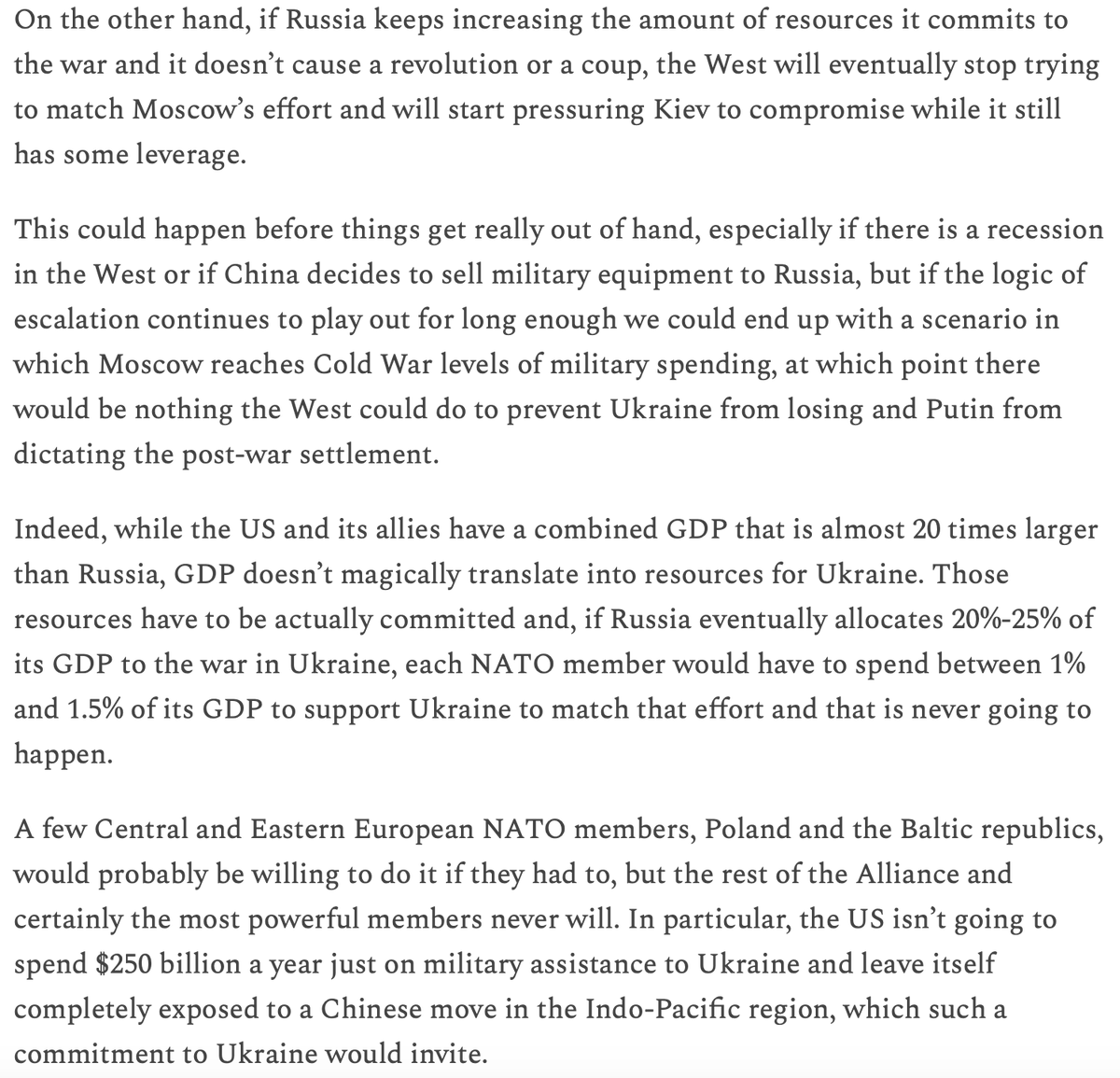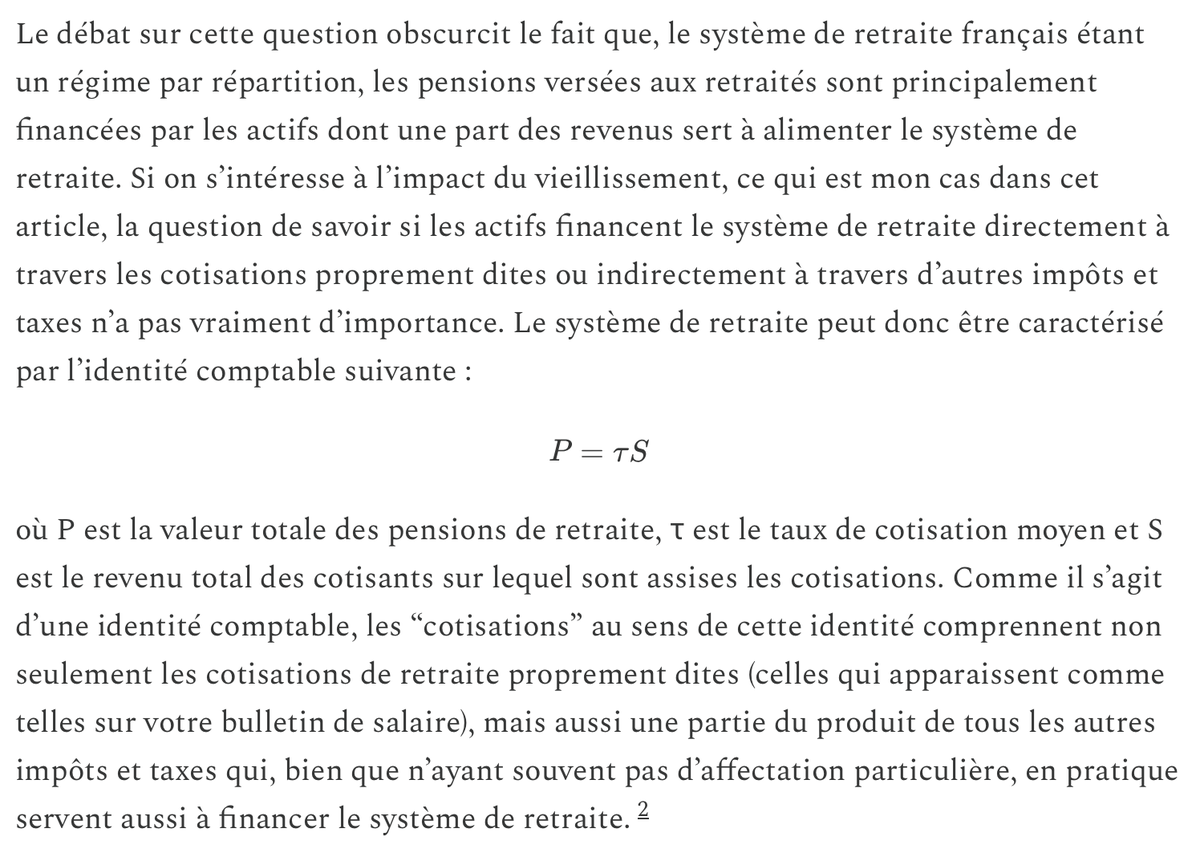I just published a post in which I discuss how the war in Ukraine could end. I review different possible scenarios and try to assess their likelihood. I conclude that it will be long as neither side can achieve a decisive breakthrough or back down soon 🧵 philippelemoine.substack.com/p/how-could-th…
I start by arguing, based on calculations I did previously, that neither side has enough manpower and equipment to achieve a decisive breakthrough this year. They don't have enough to achieve a sufficient relative advantage but also don't have enough in absolute terms.
In addition to a lack of armor, which the Western deliveries to Ukraine won't suffice to solve, both sides are going to have a serious problem with ammunition and this will limit their ability to successfully conduct large-scale offensives.
According to press reports, US officials are aware of the problem, but they think NATO can help Ukraine overcome it by turning its army into a force that fights more like the US and relies more on combined arms tactics, but I argue that it's unlikely to work. 

Some claim that, due to the technological superiority of Western gear, Ukraine doesn't need a large numerical advantage in manpower and equipment to achieve a decisive breakthrough, but I argue based on analysis of previous conflicts — especially the Gulf War — that it's wrong.
In particular, I draw from a paper by Stephen Biddle, which convincingly argues that mass, technological superiority and skills combine in a highly nonlinear way to produce outcomes on the battlefield, that any victory Ukraine might achieve will come at a very high cost. 

The result is that, even if Ukraine achieves some success on the battlefield this year, it should be limited and will result in significant losses in manpower and equipment. The same argument applies, perhaps even more so, to Russia.
I argue that only if one side made a catastrophic mistake and launched a wildly overambitious offensive without keeping enough forces in reserve to be able to defend against a counter-attack could the war end quickly, but that it's unlikely to happen.
Another possible scenario is that of a long but one-sided war ending with a decisive victory by one side, but I argue that it's not very likely either and a long war in which both sides alternate victories and defeats before it ends in a stalemate is more likely.
One of the reasons is that as long as neither side can achieve success on the battlefield without significant losses (as I have argued above), military, political and bureaucratic factors will conspire to create more favorable conditions for the side that just suffered a setback.
This suggests a war that can be modeled a bit like a mass on a spring, where any gains in one direction by one side creates the conditions for the other to make gains in the opposite direction next. 



For the scenario of a long but one-sided war to be realistic, one side would have to scale down their commitment, but I argue that now that both sides have put their credibility on the line it's unlikely to happen anytime soon. 

I argue that, although the Biden administration's plan to surge military assistance to Ukraine this year so it will be able to take back strategic territory in the South and force Putin to make a deal will probably fail, the US and its allies won't scale down their commitment.
But while despite what some leaks suggested recently in the US, I think neither side is likely to back down anytime soon, I explain why they also can't keep this up forever. 



I argue that the fact that both sides can’t back down but also can’t keep this up forever potentially sets the stage a very dangerous situation, because it creates strong incentives on both sides to escalate in order to break the stalemate and end the war more quickly. 



This collective action problem could lead to a scenario in which there is a runaway escalation, in which both sides gradually increase their commitment in the hope to end the war more quickly, but paradoxically only lengthen it. 

This could result in a decisive Ukrainian or Russian victory depending on who is no longer able or willing to match the other side's effort first.
I argue that if Russia blinks first, unless that's because in trying to match the West's effort Putin causes a revolution or a coup that plunges the country into chaos, but that it's pretty unlikely because he'd probably back down first and the West would facilitate it. 

But another possibility is that Russia will somehow manage to reach Cold War levels of military spending, at which point there is nothing the West could do to prevent a Ukrainian defeat, because it would require a commitment on the part of the West that is not realistic. 

However, such a scenario also seems very unlikely, because it would require a complete overhaul of Putin's regime that would be difficult to achieve and very dangerous for him, so he is unlikely to attempt it. 



Nevertheless, however unlikely it may be, I don't think we can entirely dismiss this scenario because it would be a disaster and it has historical precedents and, in the course of a long war, very surprising things can happen.
Anyway, I just tried to cover the main points here, but there is more in the essay and you should read it for the details. I hope that it will stimulate discussions about how the war could end because people don't focus on the end game and I think it's dangerous.
Moreover, as I say in the introduction, many people take part in the policy debate but aren’t willing to make any kind of predictions, which I think is a bit like showing up to a ball when you’re not willing to pay the price of admission.
P. S. I've added an addendum after someone made a comment on this passage which I think raises an interesting question. 
https://twitter.com/phl43/status/1627675007743668224

• • •
Missing some Tweet in this thread? You can try to
force a refresh














